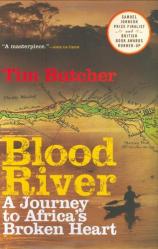Blood River: A Journey to Africa’s Broken Heart
Review
Blood River: A Journey to Africa’s Broken Heart
In this unforgettable African odyssey, the London Daily
Telegraph's Tim Butcher takes the reader on a dangerous and
disturbing 44-day trek along the path of the Congo River, from the
heart of sub-Saharan Africa to the Atlantic Ocean. Butcher's
trip, which he dubs "ordeal travel," proceeds through the heart of
the Congo (formerly the Belgian Congo, later Zaire) by motorbike,
barge and dugout canoe, guided at times by a pygmy human rights
activist, a UN riverboat captain and a Congolese gangster,
threatened by gunfire, shakedowns, killer ants, psychotic
militiamen and whispers of cannibalism.
Why risk it? The project is variously driven by the
journalist's hunger to understand the most lawless and physically
impenetrable country on his beat (which, mindbogglingly,
encompasses much of the African continent), to indulge a personal
obsession with the Congo that began after his first reporting trip
in 2001, and to carry off the seemingly impossible feat of doing
the whole trip overland, following in the footsteps of the British
explorer --- and fellow Telegraph employee --- Henry Morton
Stanley, the first outsider to chart the Congo River in
1877. (Stanley is also remembered for tracking down the
Scottish explorer Dr. David Livingstone, who had been missing in
the Congo for several years, leaving the phrase "Dr. Livingstone, I
presume?" to eclipse Livingstone's rightful legacy.)
Outside one or two cities, conditions in the Congo are so
ferociously violent and anarchic that every official and unofficial
source Butcher approached in three years of planning told him the
trip was suicidal. As recently as the 1960s, the Congo had an
elaborate network of functioning roads, railways, buses and even
luxury ocean-going liners, built (using with near-slave labor) by
Belgian colonialists who controlled the Congo from 1884 to 1960.
But since independence, a series of deeply corrupt rulers and the
bloodiest civil war on the planet have left rival militias to
terrorize the country. Some 1,500 Congolese still die every
day from war-related causes and thousands of miles of road,
airports and enormous stretches of previously navigable Congo river
have been abandoned so that almost no one travels anywhere except
by air. Butcher despairingly finds towns on his route where a
Belgian traveler could once have bought a commercial ferry ticket,
but which are now among the few spots on earth to fail what he
calls the "Can you buy a Coke?" test. (You could, he writes,
sooner fly to the moon.)
One of Butcher's most crushing discoveries is that, because
anti-government militias and government soldiers alike regularly
brutalize cities and villages, millions of defenseless Congolese
now view the bush as the only place they can really be
safe. In a perverse reversal of progress, over and over again
Butcher is told that he is the only white man some of these remote
villages have seen in decades. He speaks with old men who can
remember visiting cities, seeing cars, greeting trains and
receiving mail, but whose grandchildren have never done any of
these things.
It's all the more tragic because the Congo's enormous natural
resources --- ivory, rubber, timber, diamond, gold, copper and
cobalt deposits --- should make it the richest country in
Africa. But with no functioning rule of law or infrastructure,
Butcher instead finds mines that are nothing but raw pits where
desperate miners claw at minerals with their bare hands, collapses
are routine, and, because of corruption, theft, bribery and the
inability to provide anything but grunt labor, the local people
receive almost nothing.
Describing a new kind of Heart of Darkness, Butcher asserts that
the real history of the Congo is one of theft, specifically theft
of its sovereignty --- first by the Belgians and later by its own
vicious and selfish African elites, who, since the late dictator
Mobutu took power in 1965, have continued to live in luxury in the
Congo's one functioning city, Kinshasa, running it as what he terms
"a perfect kleptocracy." In a sign of real despair, some
Congolese he met who were trapped by geography and circumstance in
increasingly cut-off towns in the jungle "were so desperate they
actually pined for the old and brutal order of Belgian colonial
life." Only the restoration of law and order and a real justice
system has any chance of turning this violent free-for-all back
into a country worthy of the name, Butcher is told again and
again.
Not surprisingly, a current of anger flows through this river
journey, surging forth in Butcher's account of the most
heartbreaking encounter of the trip. In the town of Kisangani
he seeks the help of a local fisherman and guide, Oggi Saidi, while
trying to hitch a ride on a boat headed out of town. Two weeks
later, his berth on a UN river patrol secured, he has one last beer
with Oggi but is powerless to help when Oggi asks him, a
near-stranger, to smuggle his 14-year-old son onto the ship with
him, to take him to South Africa, to save him from the
Congo. This must be Africa's broken heart.
Reviewed by Elliott Walker on December 22, 2010
Blood River: A Journey to Africa’s Broken Heart
- Publication Date: October 1, 2008
- Genres: Nonfiction
- Hardcover: 384 pages
- Publisher: Grove Press
- ISBN-10: 0802118771
- ISBN-13: 9780802118776




